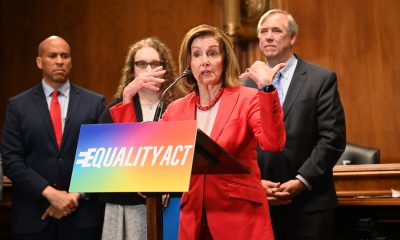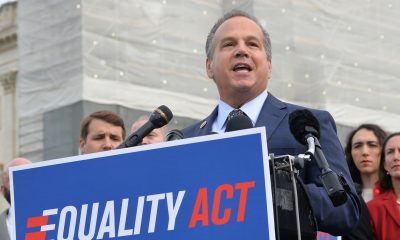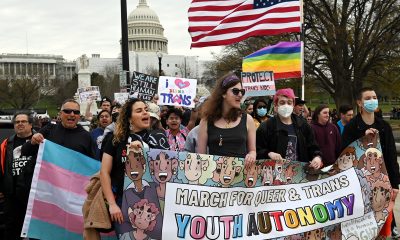National
Cicilline victory gives Congress 4th gay member
Gay Providence mayor wins House seat; Pougnet falls short in Calif.
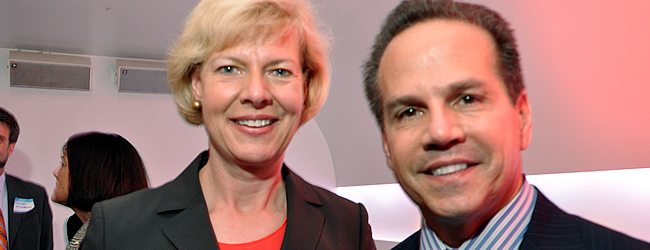
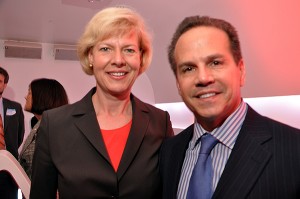
U.S. Rep. Tammy Baldwin and Rhode Island Mayor David Cicilline who won a Congressional seat Tuesday. (Blade photo by Michael Key)
The election of an openly gay Rhode Island politician to the U.S. House proved one of the few bright spots on Election Day for the LGBT community.
David Cicilline, who’s gay and the mayor of Providence, R.I., defeated his Republican opponent, John Loughlin, a Rhode Island State Assembly member.
According to the Rhode Island Board of Elections, Cicilline won by taking 50.6 percent of vote in the state’s 1st congressional district while Loughlin earned 44.6 percent.
“I am thrilled to be the next Congressman from Rhode Island’s First District and so grateful to the members of the LGBT community who supported my campaign,” Cicilline said. “I look forward to going to Washington and fighting for the issues important to all of us — creating good jobs, protecting Social Security, working to fight global climate change and, of course, fighting for full equality for our community.”
Chuck Wolfe, CEO for the Victory Fund, commended Cicilline for his victory in a statement.
“Mayor Cicilline will be a strong advocate for all Rhode Islanders, but he will also be an authentic voice for the millions of gay, lesbian, bisexual and transgender Americans who long for the day when we will be treated equally under law,” Wolfe said. ”We are enormously proud of him and grateful to Rhode Island voters.”
Cicilline’s election positions him to become the fourth sitting openly gay member of the U.S. House when the 112th Congress begins in January. He’ll succeed Rep. Patrick Kennedy (D-R.I.), who’s retiring from Congress at the end of this year. Gay Reps. Jared Polis (D-Colo.), Barney Frank (D-Mass.) and Tammy Baldwin (D-Wisc.) all won re-election Tuesday.
The Providence mayor was favored to win because he was running in a Democratic stronghold and was a powerhouse fundraiser. According to Federal Election Commission reports, Cicilline raked in nearly $1.7 million over the course of his campaign.
Cicilline earned the endorsement of many national LGBT organizations, including the Human Rights Campaign and the Victory Fund.
In a statement, Michael Cole, an HRC spokesperson, said he’s “thrilled” that Cicilline will join the members of Congress who are openly gay.
“No doubt he will carry on the record of retiring Rep. Patrick Kennedy in ensuring Rhode Island’s first district is represented by an effective congressman in promoting equality for all people,” Cole said.
Signs showed the race was tightening in the week before the election. While earlier polls showed Cicilline ahead of Loughlin by double-digit numbers, the lead dropped to single digits in some polls the week before the campaign.
The Loughlin campaign also engaged in what could be seen as gay-baiting in the weeks before the election. Loughlin ran ads emphasizing that he’s a husband and a father — possibly a reference to the fact that Cicilline is gay and single — and defended “Don’t Ask, Don’t Tell” during a debate.
The news wasn’t as good for other openly gay candidates seeking election to Congress. Both were Democratic candidates who faced the challenge of unseating incumbent Republicans in traditionally GOP districts during an election that was seen as a Republican wave.
Steve Pougnet, who’s gay and mayor of Palm Springs, Calif., lost his bid to unseat six-term incumbent Rep. Mary Bono Mack (R-Calif.).
According to the California secretary of state’s website, with 445 of 624 precincts reporting, Bono Mack claimed 51.5 percent of the vote compared to the 42.1 percent of the vote earned by Pougnet. A third-party conservative candidate, Bill Lussenheide, won 6.4 percent of the vote.
Prior to the start of this Congress, Bono Mack had the support of many in the LGBT community for voting twice against the Federal Marriage Amendment. She also supported hate crimes legislation as well as a version of the Employment Non-Discrimination Act.
But the Republican lawmaker’s vote this year against “Don’t Ask, Don’t Tell” repeal earned the rancor of many LGBT people. Others in the LGBT community also flocked to Pougnet because his election would have made him the first person in a same-sex marriage and the first gay father elected to Congress.
Pougnet lost the race even though he managed to be on par with Bono Mack in terms of fundraising throughout much of the campaign. According to the FEC, the Democratic candidate raised nearly $1.7 million while Bono Mack raked in more than $2.2 million.
Both HRC and the Victory Fund had endorsed Pougnet in his bid and expressed disappointment in his loss on Election Day.
Cole said Pougnet’s loss is sad not just for his district, but for Congress because the body “needs more voices like him.”
“Pougnet would have been the first gay parent to serve in Congress but remains a leader in our community and a powerful force for equality,” Cole said.
On the other side of the country, Ed Potosnak, a schoolteacher and former staffer for Rep. Mike Honda (D-Calif.), lost his bid to unseat Rep. Leonard Lance (R-N.J.), a one-term incumbent.
According to the Westfield Ledger newspaper, with all but one precinct reporting, Lance claimed 59 percent of votes to defeat the gay Democratic challenger.
Potosnak’s chances of winning were widely seen as slim. Neither HRC nor the Victory Fund endorsed him in the race. Still, the candidate received an endorsement from the National Stonewall Democrats.
Michael Mitchell, Stonewall’s executive director, said Potosnak ran a “solid, clean campaign” that focused on education and business growth.
“As a teacher and small business owner, Ed knows firsthand the struggles of the constituents of the district, something that his opponent Leo Lance has forgotten, given that he spoke about jobs on the House floor for under two minutes during the entire 110th Congress,” Mitchell said.
In addition to Cicilline, the Victory Fund announced that more openly LGBT candidates won election to public office than in any other year. The group, which works to elect openly LGBT candidates, said at least 106 of its 164 endorsed candidates won their races.
Specifically, Victory Fund celebrated wins by Jim Gray as mayor of Lexington, Ken.; Nickie Antonio as the first openly gay member of the Ohio House; Marcus Brandon as the only out gay state lawmaker in North Carolina; and three newcomers in Maryland who boosted the state’s openly gay and lesbian delegation to seven.
Iowa justices ousted
While celebrating the victories of openly gay candidates around the country, LGBT advocates expressed disappointment and concern after three state Supreme Court justices who ruled in favor of same-sex marriage rights in Iowa were ousted by voters.
The anti-gay group National Organization for Marriage spent $600,000 on TV ads and a statewide bus tour in an effort to remove the justices, an effort decried as an attempt to intimidate justices across the country.
“By their own admission, NOM’s Iowa strategy was about sending a warning shot to judges nationwide,” said HRC President Joe Solmonese. “NOM and its secret donors will continue to target judges around the country if they rule in favor of marriage equality and will foster an anti-gay, hostile environment in the process.”
New York
N.Y. lawmaker vows ‘Pride flag will fly again’ at Stonewall Monument
After a Jan. 21 policy shift, Pride flags were banned at national parks, prompting backlash from Bottcher and LGBTQ advocates.

Hours after news broke that the National Park Service would no longer allow Pride flags to fly at the Stonewall National Monument — the birthplace of the modern LGBTQ rights movement in the United States — the Washington Blade spoke with New York State Sen. Erik Bottcher, who represents the area surrounding the Stonewall Inn and the national monument.
During the interview, Bottcher, who is gay, spoke about the policy change and outlined steps he plans to take in the coming days to push for its reversal.
“This is another act of erasure,” Bottcher told the Blade. “It’s a cowardly attempt to rewrite history and to intimidate our community. This is Stonewall — it’s where we fought back, where we ignited a global movement for equality — and we refuse to go back. We’re not going to accept these acts of erasure.”
The Stonewall Inn became a flashpoint in 1969 after NYPD officers raided the bar, part of a longstanding pattern of police harassment of LGBTQ spaces. The raid sparked days of protest and resistance along Christopher Street, now widely recognized as the catalyst for the modern LGBTQ rights movement.
While the events are often referred to as the “Stonewall Riots,” many activists and historians prefer the term “Stonewall Uprising,” emphasizing that the resistance was a response to systemic oppression rather than senseless violence. LGBTQ patrons and community members fought back — shouting “Gay Power!” and “Liberate Christopher Street!” — as crowds grew and frustration with police abuse boiled over.
Since the uprising, LGBTQ people and allies have gathered annually in June to commemorate Stonewall and to celebrate Pride, honoring the movement that placed LGBTQ voices at the center of the fight for equality.
In June 2016, then President Barack Obama officially designated the space as the Stonewall National Monument, making it the United States’s first national monument designated for an LGBTQ historic site.
Now, nearly 10 years later, President Trump’s appointed NPS acting director Jessica Bowron changed policy on Jan. 21 regarding which flags are allowed to be flown in national parks. Many, including Bottcher, say this is part of a larger targeted and deliberate attempt by the administration to erase LGBTQ history.
“It’s clear they’re making a conscious decision to erase the symbols of our community from a monument to our community’s struggle,” he said. “This is a calculated and premeditated decision, and it could be — and should be — reversed.”
“Let’s be clear,” Bottcher added, “they wish we didn’t exist … But we’re not going anywhere. We refuse to go back into the shadows.”
When asked why it is critical to challenge the policy, Bottcher emphasized the importance of visibility in preserving LGBTQ history.
“This is why it’s so important that we not let this stand,” he said. “Visibility is critical. When people see us, learn about us, and get to know us, that’s how we break down prejudice and stereotypes. We cannot allow them to push us back into the shadows.”
Other LGBTQ leaders and elected officials were quick to condemn the removal of the Pride flag, which had flown since the site’s official designation as a national monument.
New York City Mayor Zohran Mamdani called the decision “outrageous.”
“I am outraged by the removal of the Rainbow Pride Flag from Stonewall National Monument,” Mamdani said in a statement. “New York is the birthplace of the modern LGBTQ+ rights movement, and no act of erasure will ever change or silence that history.”
“Our city has a duty not just to honor this legacy, but to live up to it,” he added. “I will always fight for a New York City that invests in our LGBTQ+ community, defends their dignity, and protects every one of our neighbors — without exception.”
Senate Minority Leader Chuck Schumer also condemned the move.
“The removal of the Pride Rainbow Flag from the Stonewall National Monument is a deeply outrageous action that must be reversed immediately,” Schumer said in a statement to The Advocate. “Stonewall is a landmark because it is the birthplace of the modern LGBTQ rights movement, and symbols of that legacy belong there by both history and principle.”
Cathy Renna, communications director for the National LGBTQ Task Force, said the flag’s removal will not erase the movement it represents.
“They can take down a flag, but they can’t take down our history,” Renna said. “Stonewall is sacred ground rooted in resistance, liberation, and the legacy of trans and queer trailblazers who changed the course of history.”
Human Rights Campaign National Press Secretary Brandon Wolf echoed that sentiment.
“Bad news for the Trump administration: these colors don’t run,” Wolf said. “The Stonewall Inn and Visitors Center are privately owned, their flags are still flying high, and that community is just as queer today as it was yesterday.”
Tyler Hack, executive director of the Christopher Street Project, said the removal was aimed squarely at LGBTQ visibility.
“The Pride flag was removed from Stonewall for one reason: to further erase queer and trans people from public life,” Hack said. “Stonewall marks the moment when queer and trans people fought back and demanded dignity. Our history is not theirs to erase.”
Bottcher closed with a promise to his constituents — and to the broader LGBTQ community — that the Pride flag’s removal would not be permanent.
“We will not be erased. We will not be silenced,” he said. “And the Pride flag will fly again at the birthplace of our movement.”
Florida
Disney’s Gay Days ‘has not been canceled’ despite political challenges
GayDays is moving forward with its planned LGBTQ meet-up

Gay Days in Orlando is preparing for its 2026 gathering though organizers have yet to release full details.
Concerns emerged about the status of the annual meetup of LGBTQ people at Walt Disney World in Orlando, Fla., after social media posts and multiple news outlets reported the event would not take place this year.
In response to inquiries from the Blade, Josh Duke, co-owner of Gay Days, clarified that an update would come this week.
“At this time, I’d like to clarify that Gay Days Orlando has not been canceled,” an email to the Blade said. “We are currently finalizing details regarding our plans for 2026 and will be making an official announcement later this week.”
Earlier this week, Gay Days posted about a pause in their plans for the annual meeting, which quickly gained traction online.
In an official statement on social media, Gay Days organizers cited several factors behind what had initially appeared to be a cancellation of their 2026 event.
“Changes to our host hotel agreement, the loss of key sponsorship support, and broader challenges currently impacting LGBTQIA+ events nationwide made it impossible to deliver the experience our community deserves,” organizers wrote. However, the statement added, “This is a pause — not an ending.”
In a longer message shared with supporters, organizers elaborated on that now-reversed decision.
“Gay Days Family — it is with very heavy hearts that we share Gay Days 2026 will not take place this year. This was an incredibly difficult decision and one that was only made after every possible option was explored.
“Gay Days has always been more than an event — it is community, family, and a place where so many memories are made. While this pause is painful, it also gives us the opportunity to step back, listen, and begin shaping a stronger and reimagined GayDays for the future. Thank you for your continued love, patience, and support. This is not goodbye — it’s a reset, and we look forward to creating the future of GayDays together.”
GayDays, which began in 1991, encourages queer Disney fans to visit the Orlando theme park while wearing red shirts to identify one another. Originally focused on gay men reclaiming the childhood joy often denied due to homophobia, the event has expanded over the years to include LGBTQ+ families on summer vacations and queer couples honeymooning in the Magic Kingdom.
Disney made history in 2019 by holding its first-ever official Pride event at its European park, Disneyland Paris. In 2023, Disneyland California hosted the first U.S. official Pride event.
Concerns about the potential cancellation had arisen amid broader challenges affecting LGBTQ events nationwide. These include changes in hotel agreements, sponsorship support, and Florida’s increasingly restrictive anti-LGBTQ policies under Gov. Ron DeSantis. Florida currently has an equality score of -3.00 out of 49 from the Movement Advancement Project, which evaluates states based on policies affecting relationship and parental recognition, nondiscrimination, religious exemptions, LGBTQ youth, healthcare, criminal justice, and transgender identity documentation.
Recent legislation in Florida has included prohibitions on hormone replacement therapy for transgender minors, restrictions on adult access to treatment, bans on drag performances for those under 18, bathroom bans for transgender people in state buildings, and expansion of the Parental Rights in Education Act, commonly called the “Don’t Say Gay” law. These measures limit public school instruction or discussion about sexual orientation and gender identity.
Gay Days Anaheim is scheduled to take place at Disneyland Resort in September.
Disney has also maintained a focus on Pride, reporting in 2022 that proceeds from Pride merchandise benefited numerous LGBTQ organizations, including GLSEN, PFLAG, The Trevor Project, Zebra Coalition, the Los Angeles LGBT Center, the LGBT Center Orange County, the San Francisco LGBT Center, and the Ali Forney Center. Pride merchandise sold internationally supports local LGBTQ organizations in those regions.
More details about this event are expected to be released on Friday.
New York
Pride flag removed from Stonewall Monument as Trump targets LGBTQ landmarks
The new NPS policy targets Pride flags amid consistent efforts from the Trump administration to minimize LGBTQ history.

A rainbow Pride flag flying at the Stonewall National Monument in New York was removed at the direction of Trump administration officials at the National Park Service, according to a source familiar with the matter who spoke to the Blade on condition of anonymity.
The source said the move had been in the works for weeks and is part of ongoing efforts by the Trump-Vance administration to erase LGBTQ identity from federally controlled landmarks.
In response to the Blade’s request for information about the new flag policy, the National Park Service provided the following statement:
“Current Department of the Interior policy provides that the National Park Service may only fly the U.S. flag, Department of the Interior flags, and the Prisoner of War/Missing in Action flag on flagpoles and public display points. The policy allows limited exceptions, permitting non-agency flags when they serve an official purpose. These include historical context or reenactments, current military branch flags, flags of federally recognized tribal nations affiliated with a park, flags at sites co-managed with other federal, state, or municipal partners, flags required for international park designations, and flags displayed under agreements with U.S. Citizenship and Immigration Services for Naturalization ceremonies.”
The statement also included official guidance on the display of non-agency flags issued by Trump-appointed National Park Service Director Jessica Bowron.
The Blade reached out to other organizations to confirm the status of the Pride flag last week, including the Stonewall National Monument Visitor Center, the NYC Landmarks Preservation Commission, and the National Parks Conservation Association. None were able to provide details about whether the flag was still flying at that time but it has since been removed.
This action aligns with other moves targeting and erasing LGBTQ history. In September, the Blade reported that three organizations originally slated to receive more than $1.25 million from the National Park Service’s Underrepresented Communities Grant Program would no longer receive funding: In Washington, D.C., the Preservation League had been awarded $75,000 to document LGBTQ+ historic resources. In Providence, R.I., the Preservation Society was slated for $74,692 to conduct an LGBTQ+ survey and prepare a National Register nomination. And in New York, the Fund for the City of New York, Inc., had been awarded $32,000 to nominate the residence of Bayard Rustin — the iconic civil rights and LGBTQ activist — as a National Historic Landmark.

